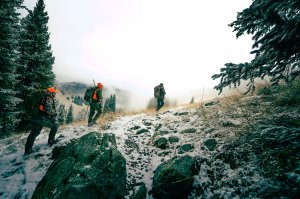We may earn revenue from the products available on this page and participate in affiliate programs. Learn More ›
It was one of those boneheaded moves I kick myself black-and-blue over. I was still-hunting an edge where loggers had thinned a forested slope. It was late in the afternoon and the rut was on, and I expected a buck to show at any moment. I saw one about 100 yards away, broadside. At a glance, I knew it was a good 4×4—the kind of buck I was after. But instead of settling in for a shot, I pulled up my binocular and studied the antlers. The buck turned to walk away. I rushed the shot—missing clean.
Every day afield is full of decisions, large and small. Making a bad decision—like raising my binocular instead of my rifle—is part of the game. But an emerging theory of psychology is shining a light on why smart people make bad decisions. The phenomenon is called “decision fatigue.” It’s getting a lot of attention in high-stakes professions like law enforcement, military, and emergency medicine, and activities like mountaineering, where bad decisions can have devastating consequences.
Here’s the bottom line: Your brain acts like a muscle. Decisions cost energy. Analyzing trade-offs that are not clear-cut is particularly costly. The more decisions you make, the more tired your brain gets. Tired brains tend toward sloppy or impulsive choices. In other words, if you squander mental energy on small, unimportant decisions, it increases the chances your brain will misfire when it comes time for a big, important one.
The good news is there are ways to conserve brainpower. They won’t completely prevent bad choices in the field, but they will help keep you mentally sharp.
Train Your Brain
1. Plan ahead/pack ahead.
Make as many decisions as you can before you venture afield. Know where you are going, where you will meet your partner, even what you will have for breakfast. Have gear packed and at the door before you go to bed.
2.Keep It Simple.
Don’t get bogged down in gadgets. Know your gear and don’t tinker with it. Yeah, that scope has a turret, but that doesn’t mean you have to constantly fiddle with it.
3. Eat well.
Staying fed and hydrated keeps your muscles and mind firing on all cylinders. Healthy snacks keep your mental energy strong. Sugar binges lead to intellectual (and physical) crashing and burning.
Read Next: 50 Great Hunting Tips
4. Know Your Firearm and Bow.
Practice shooting until your body takes over with muscle memory. This includes developing strong safety habits.
5. Get Enough Sleep.
A well-rested brain is an efficient brain. Early mornings and long road trips are part of hunting, but adequate bunk time will pay off. I believe in trophy naps.
6. Make lists and keep journals.
Give your memory a break by jotting down details.
7. Pay attention.
When your tired feet start to stumble, your mind is vulnerable too. I’m still sore I missed that buck, but other decisions carry far more profound consequences. Every day, hunters make decisions about firearms handling and backcountry routes that are literally life-and-death. There are plenty of good reasons to avoid decision fatigue. Putting a buck in the freezer is just one of them.

